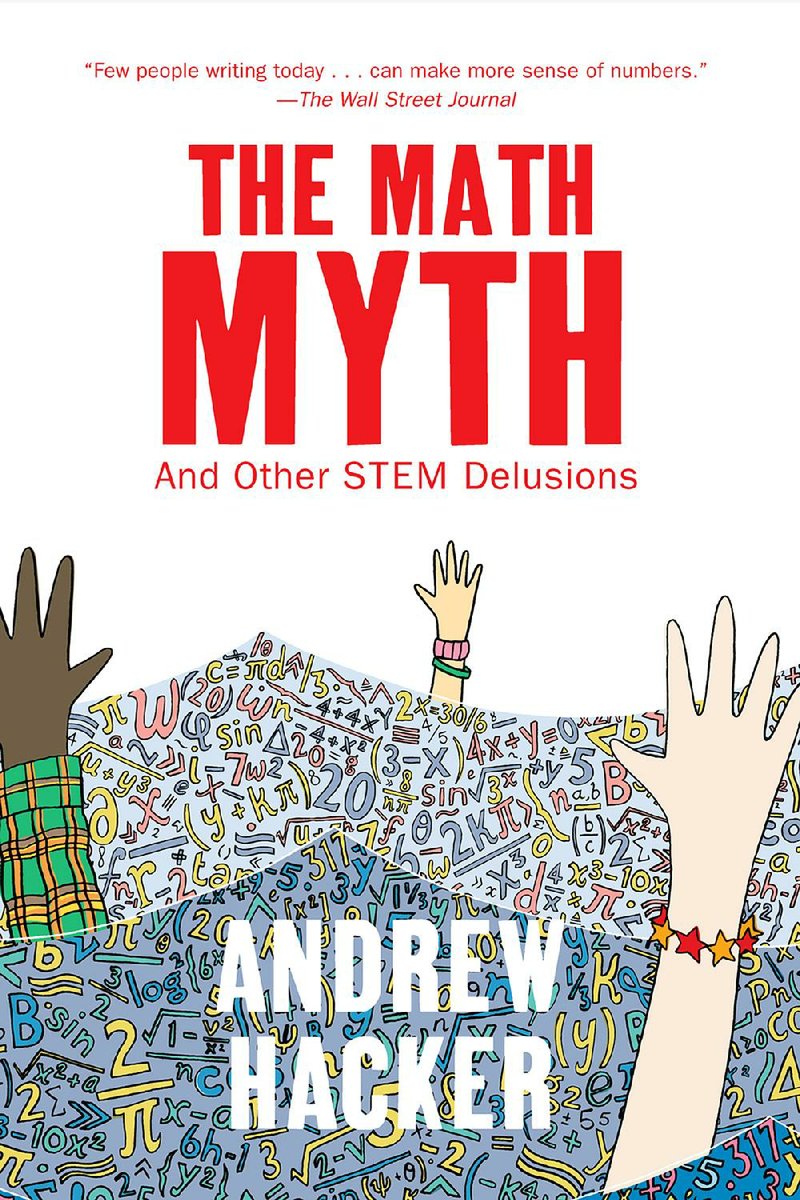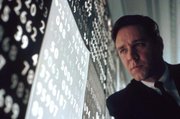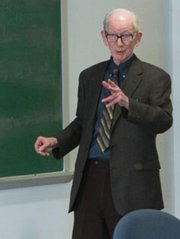Chevy Chase played Gerald Ford without the aid of makeup or prosthetics. That was part of the joke -- a snarky 32-year-old preppie playing a stolid Midwesterner, an accidental president who despite ample evidence of his intellectual and physical competence (he'd been voted most valuable player by his teammates on the University of Michigan football team) was largely seen as slow-witted and clumsy.
When the fake reporter Jane Curtin asked Chase as Ford a convoluted question about budgetary figures, he knitted his brow and replied, "It was my understanding there would be no math during the debates."
No doubt somebody had uttered those words before, but that's probably the moment they became something of a catchphrase, a mantra repeated by people who have no idea of its origin but find it useful. (If it is attributed, Ben Stiller's 1994 film Reality Bites is usually given as the source.) If you work in an environment -- like a newspaper -- that employs a lot of people with liberal arts backgrounds you probably hear some variation of the quote on a weekly basis. Around here, people throw up their hands at the mention of compound interest. An awful lot of them would probably describe themselves as math phobic.
There's no shame at not being good at math in this country. A lot of people even seem proud of their poor ciphering skills. The upshot is that it feels like a confession when I say I was pretty good at it -- I liked it even.
In high school I made it through algebra, geometry, algebra the second and sort of through calculus -- sort of through because I only thought I'd grasped calculus. Apparently the class I was in was woeful and benefited from a lenient grading curve. My marks in the class were such that I was selected as my high school's representative to the state scholastic competition. When I got there the test I was asked to take looked like it was written in Martian.
Still, I was somehow able to "clep" (to pass the College Level Examination Program test and acquire credit for) college algebra and calculus. The only college math courses I took were something along the lines of basic business arithmetic. And I counted myself lucky for having avoided math classes.
Thinking back on it, I'm not sure why I was so keen to avoid math. Part of it may have been the lack of forgiveness -- math is a sport with clear outcomes, you can't employ rhetoric to disguise a weak argument -- but the larger part was cultural. We weren't supposed to like math, it was supposed to be difficult and hard to hold in one's head. But the truth was, I did enjoy it -- at least after a rough patch with quadratic equations.
But I still remember the moment when something clicked in my head and I understood them. It was like the time my dog Bork finally figured out how to use the stairs to the basement in the house we used to live in. For the next half-hour or so he looped through the house, racing down the stairs and out the cellar door into the yard, then up onto the deck, back through the kitchen and down the stairs again. The look on his face was pure joy.
And so I worked my quadratic equations with a furious pencil. When I was done with my homework, I went looking for more.
...
These days, I couldn't solve a quadratic equation with a gun to my temple. I can do simple algebra (whatever you do to one side of the equation you also do to the other) and figure percentages in my head. I've probably forgotten 80 to 90 percent of what I used to know.
It's easy to understand why. I don't use math in my daily life. There's a calculator on my phone and on my computer desktop (and my actual desktop as well). Spreadsheets add figures up. I check my bank account online; there's no need for me to scratch in a check registers. I've offloaded most calculations onto machines that make them far faster and more accurately than I can. Theoretically I've freed up a lot of memory in my brain, that I can now fill up with pop effluvia and whiskey trivia.
"Unlike literature, history, politics and music, mathematics has little relevance to everyday life. And I say this as a professor of mathematics."
The quote is from Andrew Hacker's new book The Math Myth: And Other STEM Delusions (The New Press, $25.95), which lays out a case for changing the way we teach and think about high school and college math education. Hacker believes too many students fail math classes, causing them to drop out. He proposes that required classes in higher mathematics be replaced by more relevant courses that promote "numeracy" -- the ability to work with the numbers that show up in everyday life, such as statistics and percentages and interest rates.
This is an opinion that's bound to be cheered by people who ran into limits with high-concept math. Once you move from the practical to the theoretical, math (for most of us) is about nothing but itself. It is a game with esoteric and draconian rules, where close never counts. And while we might realize that it makes many things possible, we understand that there are a gifted few who see the world through numbers, like Russell Crowe in A Beautiful Mind or Dev Patel as Srinivasa Ramanujan in the just-released The Man Who Knew Infinity. There are people who like math and have a knack for it -- good for them.
But we don't force the tone deaf to sing in the choir; we don't ask the physically inept to play varsity quarterback.
If you read The Math Myth in a vacuum, you'll probably feel pretty good about Hacker's assertions, which might line up with your intuition. And he's probably right about a lot of things -- we do need to increase the average citizen's numeracy: Polls indicate that nearly 80 percent of us don't know what a trillion is (I'll save you Googling: It's a million millions, which is the same as a thousand billions) and that -- according to a 2012 Dartmouth study -- most baby boomers, now on the cusp of retirement, struggle with "basic, real-life financial arithmetic." When the fast-food cash register with the pictures of food instead of numbers and the inability of millennial store clerks to make change are staples of the hack comedian, should we really expect students planning to go into law or medicine or (God help them) journalism study polynomials and primes?
We might expect mathematicians to be critical of Hacker's work, and some have been. Evelyn Lamb, a math professor at the University of Utah who blogs about math for Scientific American, published a devastating critique of the book on Slate.
"... Hacker's book has so many problems in both substance and form that it's hard to take his thesis seriously," Lamb writes. "I kept track of errors, unreferenced claims, and misleading arguments as I read The Math Myth, and I found so many that I'm halfway tempted to publish an annotated edition of the book. ... Ironically, many of his arguments would make excellent examples for a John Allen Paulos-style book about mathematical illiteracy."
She argues that time and time again, Hacker "relies on the reader's ignorance or fear of mathematics to make mathematics education sound scarier than it is .... Throughout the book, Hacker uses jargon to make math topics sound more intimidating. Students, he laments, are asked to master 'associative properties.' It sends shivers down the spine ... unless you know that the associative property of addition is the one that says 5+1+3=6+3=5+4 -- that is, it doesn't matter whether you add the first two numbers together and then the third or the last two and then the first. This is a basic property of addition that most students should learn in elementary school."
Stanford mathematician Keith Devlin came to a similar conclusion: "The pity is, Mr. Hacker is right on target with his analysis of much that is wrong with what goes on in school math classes (through no fault of the teachers, I should add, since the majority have to teach what is mandated, and tested ad nauseam), and he is fortunate to have access to a large megaphone -- the NYT -- to make his analysis known. Unfortunately, his narrow and in many cases out-of-date perception of what mathematics is, together with his many misunderstandings of the nature of subjects such as algebra and the importance of, say, parametric representations, mislead those who have similar misunderstandings, and alienates those of us in the math biz who would otherwise be lining up alongside him."
And while I -- the guy who doesn't use much math in my daily life -- am not really equipped to form judgments about Hacker's characterizations of math and the way it is taught, the deeper I read in the book the more it felt as though the author was trying to assure me that my ignorance was not only normative, but somehow virtuous, that mathematicians were a slightly different species, admirable in some ways but not fully, you know, human. I began to distrust Hacker's insistence that math is somehow a field apart that allows us no insight into other aspects of human endeavor. I've heard similar arguments made against the utility of fiction.
Math can nourish us in the same ways that music and art can -- it can give us a glimpse of the infinite and unchangeable. Math is a system for describing the universe. At the very least there is an inherent morality to mathematics: There is what is right and there is everything else.
And I want to resist the impulse to shave away all that is deemed unnecessary to the pursuit of money; we are diminished by whatever options we foreclose. Young athletes should play many sports, not focus on one to increase their chances of a scholarship or career. We ought to explore a lot of different things; it is OK to dabble, and I reject the notion that algebra is beyond the ken of the average person.
I don't think it requires any special talent to appreciate math any more than I think it takes a special ear to appreciate Bach's Mass in B minor. It just takes (the right kind of) education.
A lot of people might be cheered by Hacker's suggestion that math is superfluous. That doesn't mean he's right. There will be math. There will always be math.
pmartin@arkansasonline.com
Style on 07/03/2016


